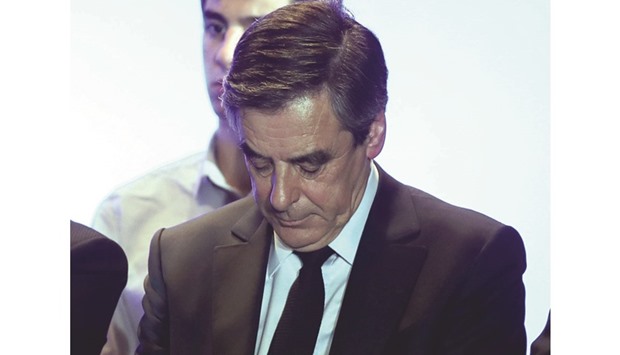A French prosecutors’ decision to launch a full judicial inquiry into claims that presidential candidate Francois Fillon paid his family for fake jobs leaves him facing a fraught two months before elections, commentators said yesterday.
Fillon, who was previously leading the race as the right-wing standard bearer, will be investigated by three magistrates over allegations of embezzling public funds and misappropriating corporate assets, prosecutors said on Friday.
The 62-year-old former prime minister has already been the subject of a preliminary probe.
An editorial in Le Parisien newspaper yesterday said the move to a full investigation represented a “surge in the pressure” on Fillon.
The left-wing Liberation said that he now faces a “perilous period, both legally and politically”.
With the first round of the election set for April 23, the timing of the magistrates’ decision could have a significant bearing on the outcome.
Far-right National Front (FN) leader Marine Le Pen has been bolstered by the scandal and has overtaken Fillon in the polls over the past month.
But Le Pen is facing her own expenses scandal, and yesterday news broke that a close confidant had been charged in a separate matter with making an illegal loan to her party.
The latest surveys before the prosecutors’ decision on Fillon showed he had regained ground and was neck-and-neck with 39-year-old centrist candidate Emmanuel Macron in second place.
Fillon denies wrongdoing but has said he would drop out of the race if he is charged, although he later appeared to backtrack and said he would put his fate in the hands of voters.
The devout Catholic won the conservative nomination by campaigning as a “clean” candidate unsullied by the scandals of his rivals.
However, since January he has been fighting claims by Le Canard Enchaine newspaper that he used allowances to pay his British-born wife Penelope at least €680,000 ($720,000) over some 15 years as a parliamentary aide.
Although French lawmakers are allowed to employ family members, it is unclear what work Penelope did and she did not have a pass to the National Assembly building.
Lawyers for the couple said they were confident the investigators would find them “innocent, at last”.
The Canard Enchaine has alleged Fillon’s wife was also paid tens of thousands of euros by a literary review, the Revue des Deux Mondes, owned by her husband’s billionaire friend, Marc Ladreit de Lacharriere.
Magistrates will investigate whether this amounts to misappropriation of corporate assets.
The paper also reported that two of Fillon’s children were paid as parliamentary advisers for brief periods.
The Fillons have argued that Penelope was legitimately employed and the couple’s lawyers say they have provided proof of the work she did.
The claims had taken a toll on Fillon’s standings in the polls, but this week surveys showed he had regained ground and was neck-and-neck with 39-year-old centrist candidate Emmanuel Macron as they fight for second place.
Macron, a former economy minister, has surged from outsider to a frontrunner but faces constant criticism from rivals that his policy platform is too vague.
While Le Pen is forecast to win the most votes in the first round, polls currently show she would be beaten by either Fillon or Macron in the all-important run-off on May 7.
The FN leader is facing her own fake jobs scandal.
Her personal assistant was charged on Wednesday over allegations that she was unlawfully paid from funds that Le Pen receives from the European Parliament, where she has a seat.
Le Pen on Friday refused to attend questioning by anti-corruption investigators, saying she would only speak to them after the election.
Then yesterday news broke of criminal charges for Le Pen confidant Frederic Chatillon, who heads a company called Riwal that did communications work for party candidates.
Prosecutors allege Chatillon used Riwal to make a loan to FN satellite group Jeanne, which would be illegal because companies are forbidden from contributing to political parties in France.
The presidential race remains highly uncertain with the unstable international picture – from US President Donald Trump and Brexit to the surge of right-wing nationalism in countries such as the Netherlands – is mirrored by an anti-establishment mood in France.

Fillon: a full investigation represents ‘surge in the pressure’ on him.
